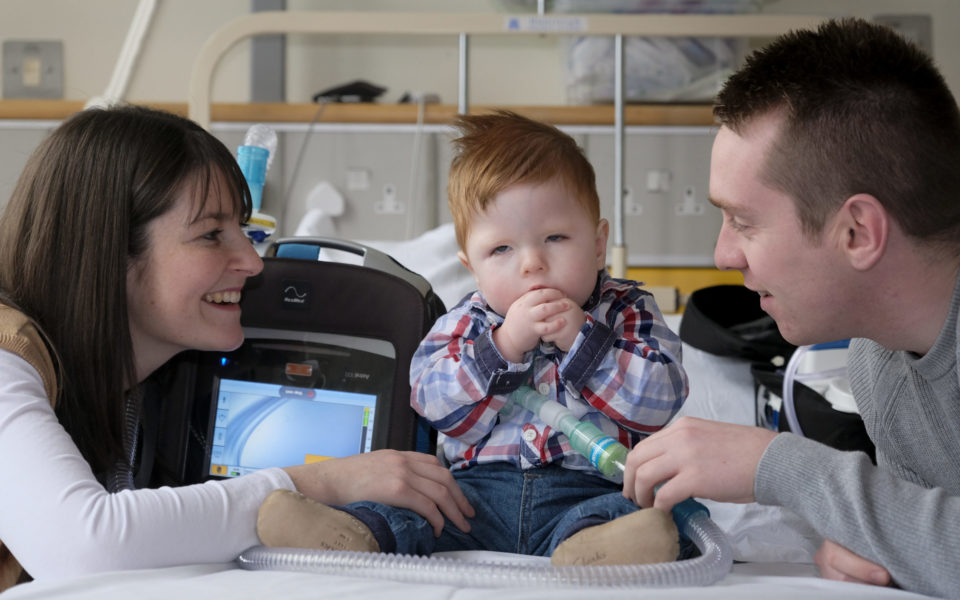Complex discharge – What to Expect
What to expect when your child with complex health needs is discharged from hospital.
This article is based on our professionals guide, 10 Principles For Complex Discharge, developed in partnership with The Pan Thames LTV collaborative.
What is complex discharge?
The term ‘complex discharge’ refers to patients who are being discharged from hospital, but who will require ongoing specialised care to live at home. Many children with serious health needs will require complex discharge to leave hospital after a long stay.
Complex discharge is carried out differently depending on where you are in the country. We have tried to make this resource as universal as possible to reflect what you can expect from best practice, but please be aware that there may be some differences in practice depending on your NHS trust.
The start of your discharge journey
This section will cover who will be involved in planning your child’s discharge, the steps they should take to prepare for discharge, and how professionals might manage communication between your family and the team around your child.
- The professionals involved in planning your child’s discharge from hospital should appoint a lead professional who will act as a discharge lead/coordinator. This person may not have an official title like “discharge lead”, but they should be recognised as the key coordinator throughout the process.
- The discharge lead/coordinator should arrange the first meeting with you. You can have an honest conversation with them about what to expect from your child’s journey home from hospital. You can also ask them questions and have an open discussion about any concerns you have.
- You will be introduced to a timeline for your child’s discharge from hospital in this meeting. The timeline will contain information about the other professionals involved in your child’s discharge journey, details about planned training and dates for meetings.
- An estimated date for discharge may be set depending on your child’s circumstances. Having a set date can help to keep the discharge on track, but for some children it can be impossible to set a date early on in their journey due to their complexity. All agreed criteria must be met before discharge date, and you should be informed if estimated date needs to be moved. Please note that it is common for the final discharge date to move, especially early on your child’s journey.
- The discharge lead/coordinator should be in touch with you at various points throughout the process to review progress so far and keep you updated. You should be able to ask questions, and the discharge lead/coordinator should encourage you to take part in decision making where appropriate.
- Your child’s specific needs will influence which professionals are best suited to look after your child, and determine who will be in the team.
- A list of contacts of key professionals and services involved your child’s care should be available to you.
- You should be given notice of and opportunity to attend multidisciplinary meetings about your child’s discharge. These are often called MDT meetings and as far as possible involve all the key professionals involved in planning your child’s discharge.
- Discharging a child with complex needs from hospital can be a long and complicated journey. The professionals involved in your child’s care have a duty to keep you informed and involved along the way.
- Professionals should communicate in an open and honest way. They will cover all possibilities, both positive and negative.
- Any barriers to communication, like English not being your first language, should be considered by professionals when communicating with you and your family.
- Communication needs to be effective and meaningful between all parties in order to get your child home as quickly and safely as possible.
- You should be informed of the services that might be involved in your child’s care. These may be necessary services like local, regional, or statutory services, as well as optional services from charity or hospices. Professionals are able to make referrals to certain optional services where appropriate.
- Depending on where you are in the country, it may be possible to use a patient health care passport. If this resource is available in your area, it is recommended that the passports should be used to share information between you and professionals about your child’s needs.
Preparation for life at home
This section will cover preparations for your new life at home, including the impact on your family, required changes to housing, training you might need, and equipment for your child’s care.
- All members of your family will need time and support to adjust and understand your child’s condition. Health care professionals should have an understanding of your family life and work in partnership with you to provide support now and into the future.
- The discharge journey can be long and difficult, especially for parents and other close family members. It can have an impact on your mental health and you should ask for help if you are struggling. Your discharge lead/coordinator can refer you to relevant services.
- Professionals may ask about your family dynamics and learn more about any existing support network you have in place that could make discharge an easier process.
- A financial assessment should be arranged for your family, and you may be signposted to appropriate funding.
- Your child will be cared for in a variety of clinical settings or places during their discharge journey. Changes in environment can have an impact on you and your child and you should be consulted before changes are made.
- You may be asked to complete a form to help professionals identify some of your housing needs. They will then carry out a home assessment to find out what changes are needed before your child is discharged.
- You should be signposted to the relevant housing officer, company, or council if your current housing situation is unsuitable. Housing may need to be reassessed after discharge as your child gets older and when their needs change.
- Transport needs and adjustments will also be assessed by professionals before your child returns home.
- The results of the assessments and any plans or timelines made by professionals should be shared with you.
- Training is a key part of discharge planning and essential for getting your child home from hospital. Training should take place alongside the wider discharge journey.
- Professionals should identify what training you and other family members will need to look after your child at home. There will be an expectation that you and other identified members of the family commit to commencing your training early on in the discharge process. Starting early helps you to have as much time as possible to practice your skills before your child comes home.
- Different levels of training should be provided for each person who will support your child in the community. This might include you, other family members, carers and professionals in the community team.
- Most training for you and anyone else looking after your child will be need to be completed before your child leaves hospital
- The equipment that your child will need at home should be identified, listed and purchased as soon as possible in preparation for discharge. Professionals should escalate to senior management if there is a lack of funding available for the equipment needed.
- You will need to be trained in how to use the equipment before your child is discharged from hospital.
- You should be given information about who is responsible for the ongoing management and maintenance of the equipment, with dates for when servicing is due.
- You should be provided with user guides and troubleshooting tips for each piece of equipment.
Final discharge from hospital and your onward journey
This section will cover what should be in place before final discharge from hospital.
- Everyone should be aware of the expected date of discharge in order to plan logistics. Consideration should be given to ensure that the services your child needs are available during weekends and bank holidays.
- Care plans should be in place, and you should have an opportunity to be introduced to the ongoing care providers before the date of discharge.
- Discharge planning may include a staggered discharge. This might be a period of time where your child spends some days at home and others at hospital. This can help you adjust to life at home and give professionals time to make sure everything you need is in place.
- Consideration should be made about your families wellbeing when moving from hospital to home. This should not be underestimated as it will likely represent a big change in everyone’s lives, and relevant support should be offered.
- You and your child’s journey will not end after discharge. The team around your child will need to ensure there are appropriate follow ups in place to support your family at home.
Real examples of complex discharge journeys
The family stories below are examples of complex discharge journeys supported by a WellChild Nurse.
If you have any comments, ideas, or suggestions about this article please contact us at [email protected]
Please don’t forget to leave feedback by clicking the smiley face!
Kathy Gibson
Digital Information Officer
First uploaded 9 August 2021
Last reviewed July 2023
Next review due July 2024







